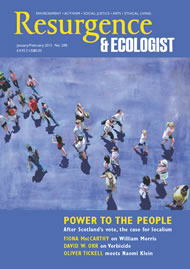The Scottish referendum demonstrated that politics can excite and involve the whole population if voters feel their choices count. But with arguments at Westminster now on the speed and extent of delivering the devo-max promises David Cameron and other major party leaders made to avert a possible majority for Scottish independence, there is a danger that people on both sides of the border will sink back into political disillusionment and apathy. We must not let that happen. Now is the time for a citizen-led constitutional convention to bring about more effective democracy, regional powers and accountability for the whole of Britain.
Scotland’s referendum has highlighted the UK’s deep democratic deficit. It has also created exciting opportunities for constructive change. With an amazing 84.5% turnout in Scotland, 45% voted ‘yes’ for full independence, with 55% voting ‘no’. It appears that the devo-max promises played their intended role. But as rain swept the placards away, it has become clear that many of the ‘no’-voters agreed with the Yes campaign in wanting greater autonomy for Scotland on policies ranging from national health, public transport and education to environmental protection and rejecting Trident nuclear weapons. Elsewhere, too, the independence debate exposed a host of discontents with the UK status quo, based as it is around London-centred corporate interests and elites.
While ideas for a new constitutional convention have interested progressives close to the Greens, Plaid Cymru, Labour and Liberal Democrats, the debates were mostly ignored by mainstream media until Nigel Farage added Ukip to those calling for a convention, albeit with rhetoric about establishing a “Federal UK” and a “fair deal for the 86% of the UK’s population who live in England”. Having pulled away from Gordon Brown’s 12-point devo-max plan, Cameron now wants to fast-track some gestures for Scotland and close down any talk of the UK’s larger crisis of democracy. Not only would a rushed process betray Scotland, but it would also undermine British democracy, as the failure of the Alternative Vote poll in 2011 dashed the hopes of electoral reform.
Before 18 September 2014 it was common to hear people raise fears about England and Wales getting stuck with a perpetual Conservative majority, as if it was the responsibility of Scottish voters to save the rest of us from the democratic deficits of the UK’s ‘first past the post’ voting system. In addition to Scotland’s legitimate drive for greater autonomy, we all have to insist that the necessary time, structures and resources are put in place for devolving real power to meet the needs of all Britain’s regions and communities. Among the ideas being put forward by Greens and others are a people-based bill of rights, electoral reform, with proportional representation for House of Commons seats and the transformation of today’s anomalous, unelected House of Lords into some form of proportionally elected senate of the regions, and the right of constituents to recall corrupt or incompetent representatives.
With the majority of status quo politicians failing to understand the gravity of environmental and security challenges such as climate, energy, and weapons proliferation, it’s now clear from Scotland’s inspiring experiment that the franchise for all UK elections should be extended to include 16-year-olds. The Yes campaign in Scotland used messages of hope that appealed especially to younger voters who wanted to be able to have a more direct say in policies for the future, from making their country nuclear-free to ensuring better health, education and social support for the disadvantaged.
The UK’s outdated and over-centralised system fosters adversarial politics and short-term fixes that are not conducive to participatory democracy or effective decision-making to achieve the long-term solutions and policies we need. A key motivation for a constitutional convention must be to develop a democratic system capable of representing and caring for all the people, including future generations. Instead of risking our fragile ecology by pandering to those who want easy pickings, as short-term governments feel they have to do, we need a constitutional settlement that promotes and rewards long-term thinking and institutional reform. We need to stop stealing from tomorrow’s citizens and develop a political system that will take seriously the needs of future people. For that to happen, British people have to get over the UK’s delusions about its place in the world. Instead of perpetuating weapons proliferation and foreign policies that inappropriately drive us towards military conflicts, we need all people to get involved in building a sustainable, democratic role for the 21st century.
The contrast between the participatory energy and turnout in the Scottish referendum and the disinterest and apathy that have characterised recent general and local elections couldn’t be clearer. We cannot afford to let the government sweep democratic change under the carpet with another rushed, botched job.
Debates on constitutional reform are bubbling everywhere. The British people – all of us – need to stop feeling like passive ‘subjects’ and become responsible, participating citizens. We must seize this moment to get a citizen-led constitutional convention to negotiate the changes that our future needs.








